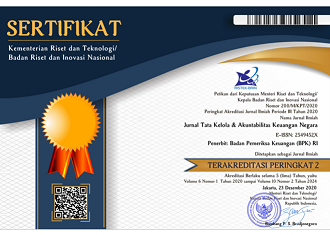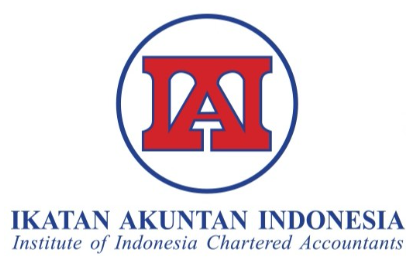The urgency of refining the accounting standards of state tax revenue and receivables
DOI:
https://doi.org/10.28986/jtaken.v10i2.1615Keywords:
International Public Sector Accounting Standards (IPSAS), Government Accounting Standard, Tax receivablesAbstract
Indonesia's Central Government Balance Sheet reflects substantial amounts of tax revenue and receivables, indicating the potential for significant state budget receipts. However, for the past 5 years, the audit report of the Audit Board of the Republic of Indonesia (Badan Pemeriksa Keuangan, BPK) on the Central Government Financial Report (LKPP) has consistently identified accuracy issues of tax receivable balances. Accordingly, this study explores the accounting problems related to tax revenue and receivables within the Directorate General of Taxes (DGT) and proposes solutions how to improve them. A qualitative case study approach was employed using data collected through documentation and triangulated interviews with the Ministry of Finance (DGT and Directorate General of Treasury), BPK, and the Government Accounting Standards Committee. Results showed that inadequate regulation on the accrual-based reporting of tax transactions leads to underreported state revenue and receivables. The findings also provide empirical evidence that adopting International Public Sector Accounting Standards (IPSAS) 23, which covers revenues from non-exchange transactions (taxes and transfers), into Indonesia’s Government Accounting Standards could solve tax revenue and receivable accounting problems. Furthermore, a comparative analysis of ASEAN countries revealed that Malaysia, Singapore, and the Philippines have already incorporated IPSAS 23 into their accounting frameworks.
References
ACCA. (2017). IPSAS implementation: Current status and challenges. https://www.accaglobal.com/content/dam/ACCA_Global/Technical/pubsect/pi-IPSAS-implementation-current-status-and-challenges.pdf
Accounting Standards for Statutory Boards. (2018). Accounting and disclosure for non-exchange revenue. https://www.assb.gov.sg/files/Docs/Default%20Source/Sb%20Frs/Effective%20As%20At%201%20January%202018/sb-frs1001_non-exchange_revenue_(2018).pdf
Ali, R. (2009). Adopting accounting norms can draw FDIs. https://www.mfa.gov.cn/ce/cebn//eng/wlxw/t631635.htm
Asian Development Bank. (2018). Public financial management systems – Indonesia: Key elements from a financial management perspective. http://dx.doi.org/10.22617/TCS189338-2
Asqolani, & Mulyana, B. (2022). Studi komparatif adopsi IPSAS 23 negara-negara ASEAN. In: P. Fitriandi (Ed.), Bunga Rampai Akuntansi Pemerintah Indonesia Kontemporer: Penguatan Laporan Akuntansi Pemerintah dalam Mendukung Fiskal Berkelanjutan (pp. 9–17). Politeknik Keuangan Negara STAN.
Bisogno, M., Pontoppidan, C. A., Hodges, R., & Manes-Rossi, F. (2019). Setting international public-sector accounting standards: Does ‘public’matter? The case of revenue from non-exchange transactions. Accounting in Europe, 16(2), 219–235. https://doi.org/10.1080/17449480.2019.1624791
Bolivar, M. P. R., & Galera, A. N. (2013). The effect of changes in public sector accounting policies on administrative reforms addressed to citizens. Administration & Society, 48(1), 31–72. https://doi.org/10.1177/009539971349875
BPK RI. (2020). The Central Government Financial Report in 2019 (Laporan Hasil Pemeriksaan atas Laporan Keuangan Pemerintah Pusat Tahun 2019). https://www.bpk.go.id/assets/files/lkpp/2019/lkpp_2019_1594712745.pdf
BPK RI. (2021). The Central Government Financial Report in 2020 (Laporan Hasil Pemeriksaan atas Laporan Keuangan Pemerintah Pusat Tahun 2020). https://www.bpk.go.id/assets/files/lkpp/2020/lkpp_2020_1624341011.pdf
BPK RI. (2022). The Central Government Financial Report in 2021 (Laporan Hasil Pemeriksaan atas Laporan Keuangan Pemerintah Pusat Tahun 2021). https://www.bpk.go.id/assets/files/lkpp/2021/lkpp_2021_1655193674.pdf
BPK RI. (2023). The Central Government Financial Report in 2022 (Laporan Hasil Pemeriksaan atas Laporan Keuangan Pemerintah Pusat Tahun 2022). https://www.bpk.go.id/assets/files/lkpp/2022/lkpp_2022_1687233330.pdf
Brusca, I., & Martínez, J. C. (2015). Adopting international public sector accounting standards: A challenge for modernizing and harmonizing public sector accounting. International Review of Administrative Sciences, 82(4), 724–744. https://doi.org/10.1177/0020852315600232
Castillo, L. M. (2014). The revised chart of accounts and the Philippine public sector accounting standards. http://pagba.com/wp-content/uploads/2014/09/Revised-Chart-of-Accounts.pdf
Christiaens, J., Vanhee, C., Manes-Rossi, F., Aversano, N., & van Cauwenberge, P. (2014). The effect of IPSAS on reforming governmental financial reporting: An international comparison. International Review of Administrative Sciences, 81(1), 158–177. https://doi.org/10.1177/0020852314546580
Djunur, I. (2020). Penerapan prinsip pengungkapan lengkap akun piutang perpajakan pada laporan keuangan pemerintah pusat TA 2017-2019. Jurnal Ilmiah Wahana Akuntansi, 15(2), 125–152. https://doi.org/10.21009/wahana.15.022
Endres, D. (2007). The determination of corporate taxable income in the EU member states (1st ed.). Kluwer Law.
Febriana, D., & Riharjo, I. B. (2017). Efektivitas penagihan pajak dalam meningkatkan penerimaan piutang pajak. Jurnal Ilmu dan Riset Akuntansi (JIRA), 6(3), 1169-1183.
Hoesada, J. (2009). Membahas masalah adopsi IPSAS paripurna dan reformasi basis akuntansi menjadi basis akuntansi hak-kewajiban paripurna (full accrual basis) Tahun 2009. http://ksap.org/Riset&Artikel/Art2.pdf
IFAC. (2015). Adoption of international standard - Cambodia. https://www.ifac.org/about-ifac/membership/country/cambodia
IFAC. (2017). Adoption of international standards - Thailand. https://www.ifac.org/about-ifac/membership/country/thailand
IFAC. (2020). Adoption of international standards - Vietnam. https://www.ifac.org/about-ifac/membership/country/vietnam
IFAC. (2022a). Adoption of international standard - Brunei. https://www.ifac.org/about-ifac/membership/country/brunei
IFAC. (2022b). Adoption of international standard - Myanmar. https://www.ifac.org/about-ifac/membership/country/myanmar
IFAC. (2022c). Adoption of international standard - Philippines. https://www.ifac.org/about-ifac/membership/country/philippines
IFAC. (2022d). Adoption of international standard - Singapore. https://www.ifac.org/about-ifac/membership/country/singapore
IPSASB. (2011). Transition to the accrual basis of accounting: Guidance for public sector entities. https://www.ifac.org/system/files/publications/files/IPSASB-study-14-3e.pdf
IPSASB. (2022). IPSAS 23 revenue from non-exchange transactions. https://www.ifac.org/system/files/publications/files/A11-IPSAS-23_0.pdf
Khairizka, P. N. (2022, June 24). BPK nilai tata usaha piutang belum memadai. Pajakku. https://www.pajakku.com/read/62ac3ed7a9ea8709cb18a5f8/BPK-Nilai-Tata-Usaha-Piutang-Belum-Memadai
Laksana, G. B. A., Putra, G. P. S. S., Jayantara, P. M., & Badriyah, S. (2019). Evaluasi penerapan sistem pengendalian intern dalam penatausahaan piutang perpajakan yang berdampak pada laporan keuangan pemerintah pusat. Jurnal Ilmiah Akuntansi Dan Humanika, 7(2).
Miles, M. B., & Huberman, A. M. (1994). Qualitative data analysis: An expanded sourcebook. Sage Publication.
Muhamad, A., & Wahyuni, T. (2017). Evaluation of internal control over financial reporting designed on tax receivable management: A case study on tax receivable management cycle at the directorate general of taxes. Proceedings of the 6th International Accounting Conference (IAC 2017), August, 212–217. https://doi.org/10.2991/iac-17.2018.38
Nakmahachalasint, O., & Narktabtee, K. (2018). Implementation of accrual accounting in Thailand’s central government. Public Money & Management, 39(2), 139–147. https://doi.org/10.1080/09540962.2018.1478516
Pratiwi, D. (2021). Analisis Dan Evaluasi Penyajian Piutang Pajak Dalam Laporan Keuangan DJP [Unpublished master’s thesis]. Universitas Indonesia. Jakarta.
Pratiwi, D., & Martani, D. (2021). Realitas penatausahaan piutang pajak pemerintah. Indonesian Treasury Review, 6(2), 139–158. https://doi.org/10.33105/itrev.v6i2.355
Republic of Philippine Bureau of Treasury. (2018). The Philippine Public Sector Accounting Standards (PPSAS). https://www.treasury.gov.ph/wp-content/uploads/2018/01/Volume-I.pdf
Rompotis, G., & Balios, D. (2023). Benefits of IPSAS and their differences from IFRS: A discussion paper. EuroMed Journal of Business. https://doi.org/10.1108/emjb-07-2022-0139
Rosenberg, R. (2022, January 4). What is a taxable event? The balance. https://www.thebalance.com/what-is-a-taxable-event-5196630
Rukajat, A. (2018). Pendekatan penelitian kualitatif (Qualitative research approach). Deepublish.
Schmidthuber, L., Hilgers, D., & Hofmann, S. (2022). International Public Sector Accounting Standards (IPSASs): A systematic literature review and future research agenda. Financial Accountability & Management, 38(1), 119–142. https://doi.org/10.1111/faam.12265
Sukmadilaga, C., Pratama, A., & Mulyani, S. (2015). Good governance implementation in public sector: Exploratory analysis of government financial statements disclosures across ASEAN countries. Procedia-Social and Behavioral Sciences, 211, 513–518. https://doi.org/10.1016/j.sbspro.2015.11.068
Tanuwijaya, J., & Budiono, D. (2014). Proses penagihan pajak dengan surat paksa berdasarkan undang-undang penagihan pajak dengan surat paksa. Tax & Accounting Review, 4(1). http://publication.petra.ac.id/index.php/akuntansi-pajak/article/view/3111
Tawiah, V. (2022). The effect of IPSAS adoption on governance quality: Evidence from developing and developed countries. Public Organization Review, 23(1), 305–324. https://doi.org/10.1007/s11115-022-00625-w
World Bank. (2013). Vietnam fiscal transparency review. https://openknowledge.worldbank.org/bitstream/handle/10986/18960/882730WP0P12870iew0Final0May0210ENG.pdf;sequence=1
World Bank. (2014). Current status of the accounting and auditing profession in ASEAN countries. http://www.afa-accountants.org/files/afa_report-printed_version.pdf
World Bank. (2018). Budgeting in Thailand. https://sdgs.nesdc.go.th/wp-content/uploads/2021/05/Budgeting-in-Thailand-Full-Report.pdf
Downloads
Submitted
Accepted
Published
How to Cite
Issue
Section
License
Copyright (c) 2024 Jurnal Tata Kelola dan Akuntabilitas Keuangan Negara

This work is licensed under a Creative Commons Attribution-ShareAlike 4.0 International License.

Jurnal Tata Kelola dan Akuntabilitas Keuangan Negara is licensed under
a Creative Commons Attribution-ShareAlike 4.0 International License





















